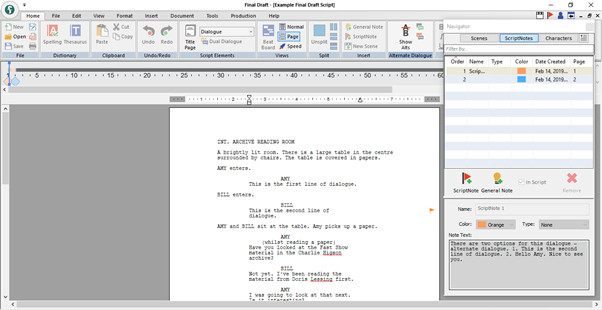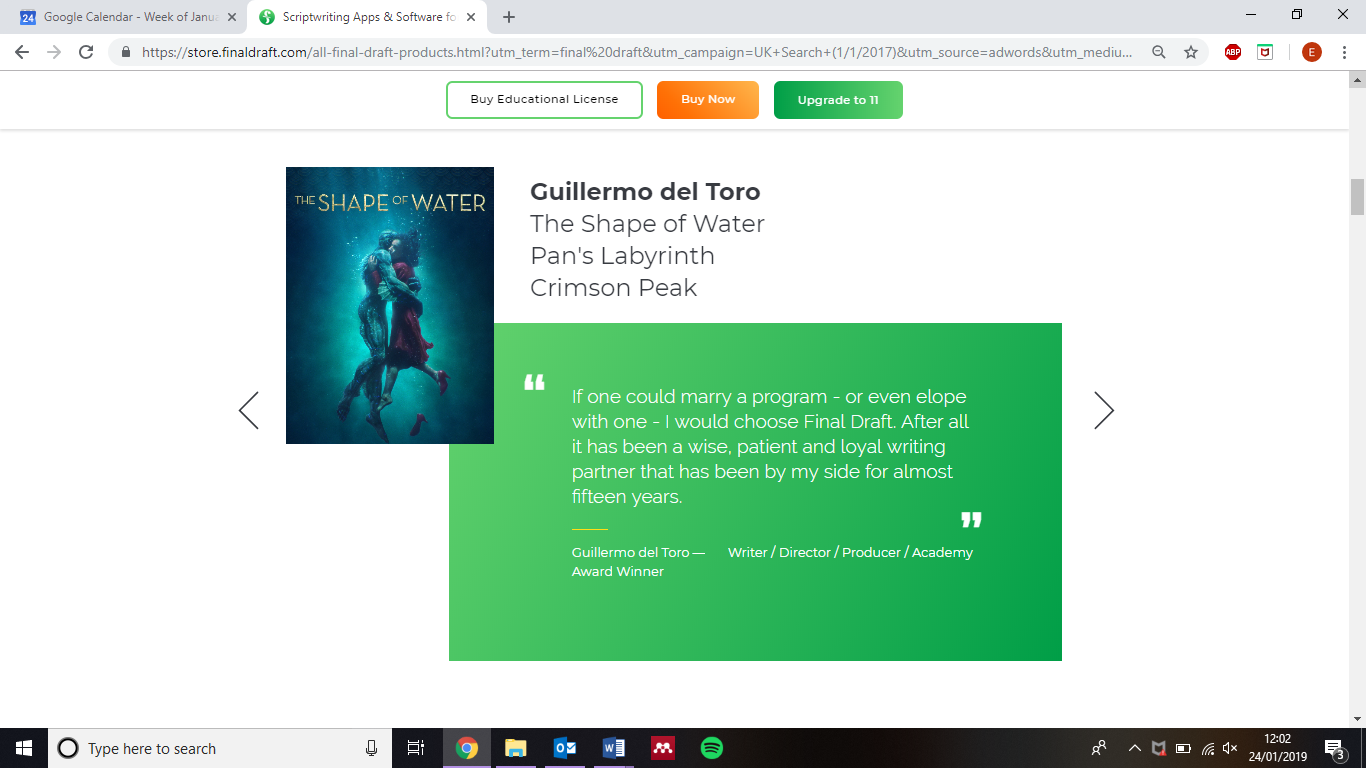Emily Walker is a CHASE-funded Doctoral Researcher at the University of East Anglia currently specialising in television comedy. Her thesis is investigating the representation of religion in four British religious sitcoms – All in Good Faith, The Vicar of Dibley, Father Ted, and Rev – to establish ‘religious sitcoms’ as a sitcom sub-genre. She is also undertaking a placement as Curatorial Assistant for the British Archive for Contemporary Writing’s TV Comedy Collection (University of East Anglia).
Archiving Final Draft: A potential digital gold mine of film and TV scripts
But can we access the creative process behind them?
Within the screenwriting industry, Final Draft is universally acknowledged as the industry standard scriptwriting software to use if you want to be taken seriously as a professional. The Final Draft website proudly boasts that companies from the BBC to Netflix to Walt Disney use the software for their productions, and includes quotes from users such as Guillermo Del Toro, JJ Abrams, and Sofia Coppola praising the ease of use and technical ability. Del Toro even humorously suggests that Final Draft has been such a ‘wise, patient and loyal writing partner’ that he would happily elope with the software.
The package – which currently costs around £200 – can write Film, TV, or theatre scripts, can be customised to suit any company scriptwriting format, allows for cross-computer collaboration, works on almost any device, and has regular updates introducing new interactive features like a beat board and alternative dialogue (which I’ll return to later). Overall, the Final Draft software is used in over 95% of film and television productions.
Due to the incredible permeation of the Final Draft software in film and television production, it was inevitable that archives would need to begin grappling with deposits of Final Draft files.
As part of the growing TV Comedy Writing collection within the British Archive for Contemporary Writing at the University of East Anglia, we have received numerous files from various television comedy writers. The volume of files will no doubt increase in the future, as our contributors are all practising writers. There is already a pressing issue with the older files; as Final Draft updates, older Final Draft files from the 1990s and early 2000s are incompatible with software upgrades and may eventually become unreadable. This creates the question: how do we preserve these files and allow them to be read by visiting researchers?
The files could be saved as a PDF/A and a typical and secure ‘read-only’ archival presentation could be provided within the Archive Reading Room. In addition, although sligtly retro - these PDFs could even be printed out for use in the archive. However, converting Final Draft files to a PDF loses valuable information relating to the creative process. Final Draft allows writers to create beat boards, link characters and scenes, write ScriptNotes and alternative dialogue (especially important in comedy, where the writer may try multiple punchlines), and use of the navigator to move freely around the document. Converting the file to a PDF only preserves the ‘final draft’ of the script and loses all of the invaluable information that can inform on a writers’ creative decisions and processes, which could be key to a researcher’s project.
To present a secure copy of the file in its native environment of Final Draft presents other immediate problems: there isn’t a read only mode. Final Draft is incredibly easy to edit. The software allows users to write in extra letters, words, or lines to the script, and whether this is done intentionally or unintentionally, editing could seriously affect the document and the researcher’s work.
There is one other alternative we have considered, which is using a special version of the Final Draft Software called Final Draft Reader. This software is intended for users who have not paid £200 for the software itself but want to read a script written on Final Draft. Reader does not allow users to create new scripts or edit them but does give access to information such as the ScriptNotes and navigator. Unfortunately, having access to ScriptNotes means the user can also accidentally create one, and the editing lock stops the user from writing or deleting it. This is also the case for features such as the alterative dialogue; a user can create the space, but not edit or delete it. Also, the Reader allows a user to move tabs around, such as the links between characters and scenes and the story map. More importantly though, the Reader does not let you access the beat board, where writers may have stored important information about the creative process (structure, story beats etc.). Therefore, while Reader seems like the best option in terms of accessing information about editing and interactivity, there are still serious problems that affect the preservation of the document and the accessibility of research information.
At the moment, these Final Draft digital files in our archive are completely inaccessible to researchers, although we have begun to process using software such as DROID and Archivematica and so will pursue the PDF/A route as a first stage and potentially look at secure alternatives, such as emulation to see if we can salvage more. As the collection expands and more files are added, the need for a safe way to access the full richness of the file increases.
We would welcome any comments from other archives who are also facing this issue or have found a solution. In fact, through DPC, we have already been introduced to colleagues at the British Library and at Sussex, who are grappling with these issues and which we are keen to follow up. In addition, DPC are also reaching out to Final Draft Pro itself, to see if the company has any interest in helping writers and archives to salvage the creative process behind the final draft. We look forward to working with them, if there is a positive response.

Final Draft reader mode. An example of a dummy Final Draft script. The picture shows the Script, Nnavigator, and ScriptNotes referring to alternative dialogue,

















































































































































Comments